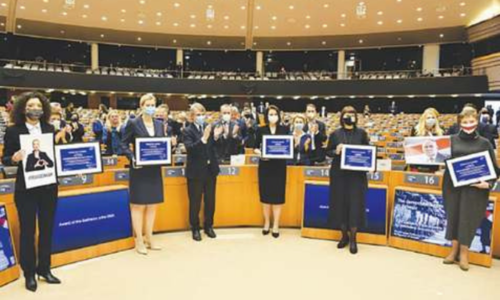ANDREI Dmitrievich Sakharov, whose 100th birth anniversary was celebrated yesterday, had struggled especially during the last 20 years of his life to save the Soviet state from itself. However, the state never paid any attention to his concerns for the future of the Soviet Union. Instead, it questioned his patriotism, and went ahead to harass him and persecute him. The state had no idea of the price it would pay by not listening to him. The Soviet state collapsed like a house of cards on Dec 31, 1991. In its place, 15 independent, sovereign states emerged.
The Soviet state is no more, and it can’t be reassembled. Had it listened to Sakharov, it might have avoided the calamity it had to suffer later. Russian President Vladimir Putin regards the dissolution of the Soviet state as the greatest geopolitical catastrophe of the 20th century, and the realisation is now widespread that the disaster was invited by the Soviet state itself, and not by Sakharov.
Read: Dissident scientist Sakharov ‘forgotten’ in Russia
Disaster might have been averted had the USSR listened to Sakharov.
Sakharov was one of the greatest champions of peace, freedom and human rights in the last century. He wanted to sign up for service in the Soviet armed forces, when the Germans invaded his country on June 22, 1941. He was 20 and had just completed his third year in physics at Moscow University. However, he was already the most brilliant student in the memory of his faculty and treated as a national asset. He was exempted from military duty. He therefore continued his studies, graduated in 1942, served as an engineer in a military factory during the remaining war years, and obtained the equivalent of a PhD degree in 1947. The next year, he joined the top secret nuclear weapon programme of the Soviet Union.
The next two decades or so were, indeed, a period of content for the young nuclear physicist. When the Soviet Union tested its first fusion-based device on Aug 12, 1953, Sakharov was widely acknowledged as the father of the Soviet hydrogen bomb. The same year, he received his DSc degree; he became the youngest person to be elected to the Soviet Academy of Sciences; and received the first of his three Hero of Socialist Labour titles — the Soviet Union’s highest civilian award for heroic and distinguished achievements.
Sakharov could have devoted the rest of his life serving his country as a highly valued military scientist or as a theoretical physicist of international eminence or as a powerful pillar in the Soviet corridors of power. However, increasingly aware of the consequences of a nuclear war between the Soviet Union and the United States, and the irrelevance of expensive nuclear tests by the Soviet Union, he became uncomfortable. From the late 1960s on, he expressed his reservations regarding the expansion of the Soviet nuclear programme and the focus and direction of Soviet sciences. In due course, he became more fierce and aggressive in criticising the Soviet state. He demanded fundamental reforms, including general liberalisation, an end to political victimisation, full-fledged rights for all Soviet citizens, freedom of information and press, basic economic reforms and democratic elections
While Sakharov’s popularity soared, the state wasn’t amused. It sprang into action, removed Sakharov unceremoniously from his prestigious position and job. It stripped him of the awards and titles given to him by the state. It didn’t permit him to travel to Oslo to personally receive the Nobel Peace Prize in 1975. A media campaign was unleashed, and Sakharov was accused of being unpatriotic and an agent of the West. His family members were also victimised.
The state became more vindictive, when Sakharov condemned the Soviet military intervention in Afghanistan and participated in a demonstration against Soviet Afghan policy. On Jan 22, 1980, he was arrested. Later, he was taken to the Volga city of Gorky in the Siberian region, where he spent almost seven years in internal exile.
It was after his death on Dec 14, 1989, that Sakharov was accorded full honours. He was buried in Vostryakovskoye Cemetery, Moscow’s largest. His funeral was attended by the Soviet president Mikhail Gorbachev, top party brass, academicians, scientists, and thousands of common people. Later, in the afternoon, tens of thousands of mourners gathered at the Luzhniki Stadium to join on the memorial service.
While history gratefully acknowledges the contribution of Sakharov to the movement for peace, justice, democracy and human rights, his mission is not over. His life and struggle will remain relevant for any struggle anywhere against unfreedoms and state tyrannies.
The writer is the former chairperson of the International Relations, Department at the University of Karachi, and a peace scholar.
Published in Dawn, May 22nd, 2021














































